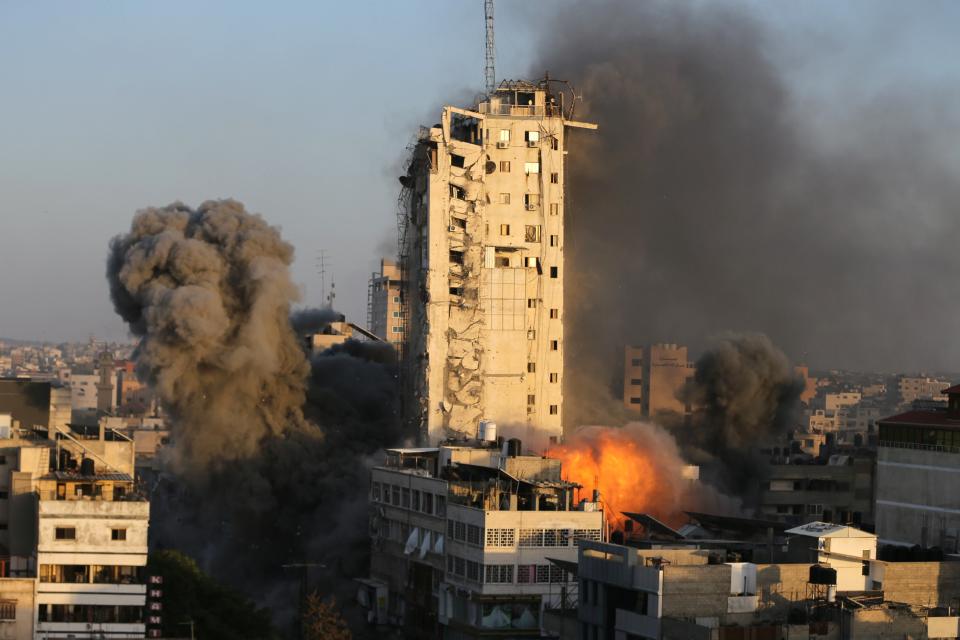The world only seems to remember the Israeli-Palestinian conflict when it reaches crisis

It’s no doubt tempting for politicians and officials in Western governments to react with a world-weary sigh of “here we go again” to the bloody escalation of an Israeli-Palestinian conflict which many of them appear to allow themselves to forget when it isn’t in the headlines.
And certainly aspects of the carnage are ominously reminiscent of Gaza in the summer of 2014, including the sense of obligation by those same governments to repeat the ritual calls for both sides to “step back from the brink”.
There are dangerous differences from 2014 as well. One is the extent of Hamas’s capacity to fire hundreds of rockets at targets deep inside central Israel, as well as much nearer to Gaza itself. Another is that this escalation, like the second intifada in 2000, started in Jerusalem - where heavy-handed policing in around the Al Aqsa Mosque among the 70,000 (including many who live in, and are citizens of, Israel) gathered for the final Friday prayers of Ramadan. This resulted in injuries to 205 Palestinians and 17 police officers. And thirdly as in Tuesday’s unrest in Lod and elsewhere it has spilled onto the streets of mixed Arab-Jewish towns in Israel itself.
It has been widely reported in Israeli as well as Arab media that on Tuesday morning Hamas were ready to accept an Egyptian-brokered ceasefire but that Israel’s government rejected it. Israeli defence minister, Benny Gantz has made it clear that Israel “is not preparing for a ceasefire” – adding: “We will not listen to moral preaching against our duty to protect the citizens of Israel.” Whether prolonging the conflict is the best way of exercising that duty, when the deaths of five Israeli civilians (and one soldier) were added on Tuesday to more than 50 Palestinians, civilians as well as militants, so far killed in Gaza, is debatable.
But in any case, the Israeli anti-ceasefire rhetoric is bound to increase speculation in some quarters that an early end to the conflict may not suit Israeli prime minister, Benjamin Netanyahu as he fights to stay in power. Until this situation began there was a chance that a coalition government would be formed without him but that bet appears off for now.
You can argue that this escalation was preventable. Key among the several factors behind Palestinian anger in Jerusalem – and therefore at the heart of how this latest violence started – is the threatened eviction of Palestinian families from the homes they have inhabited for decades in the inner East Jerusalem district of Sheikh Jarrah so that Jewish settlers can be installed in their place.
This in turn is a – rather concentrated – symbol of a much wider issue rarely if at all mentioned in the hand-wringing declarations of Western leaders about the present, admittedly very dangerous, escalation: namely the occupation of the 22 per cent of historic Palestine, in the West Bank, Gaza and East Jerusalem which nearly every other foreign democratic government has broadly delineated for a future Palestinian state.
Yet Israeli encroachment on that territory has rapidly accelerated, in defiance of international law. Indeed, in the last four years, the pro-settler groups in Israeli politics, seemingly emboldened by their indulgence by Donald Trump’s presidency, have increased their influence.
No, this is absolutely not to condone or justify Hamas’s use of rockets during the present escalation. Indeed, as has been seen all too vividly-demonstrated in the past 72 hours it endangers the lives of Israeli citizens, and less directly those of Palestinians, in open defiance of international law. And even if it didn’t it would be counterproductive as it allows the international argument to become one about terrorism instead of the root causes and deep sense of grievance among Palestinians hungering for the freedom and statehood most of us take for granted.
But it is a reminder that the world ignores the Israeli-Palestinian conflict at its peril. It’s striking how neglected it is outside Israel and the Occupied Territories until it suddenly lurches out of control, as it has now. And despite the deceptive periods of “calm” it never fails to resurface.
That – and the urgent need to start undoing the damage of the Trump years – is an urgent reason for US President Joe Biden, and European leaders in his wake, to intervene now, using his undoubted influence with America’s close ally Israel. And then to sustain that involvement in pressing to reverse those root causes when this eruption of violence finally ends after goodness knows how many casualties.
Way back in 1995, the Gazan Haider Abdel Shafi, probably the greatest, and certainly the most independent, of all Palestinian political leaders remarked that Hamas would never have risen in the way it had if serious efforts had been made to end the fighting. Indeed, that Hamas would never have the power to “disrupt a credible peace process”.
For the failure to end the ever-increasing miseries imposed on Palestinians, let alone for the absence of such a peace process, the international community has to take its fair share of the blame.
Donald Macintrye is the author of ‘Gaza: Preparing for Dawn’
Read More
Watch live as Dominic Raab delivers statement on Israel-Palestine conflict
In East Jerusalem’s Sheikh Jarrah we see the essence of the Palestinian struggle

 Yahoo Finance
Yahoo Finance 